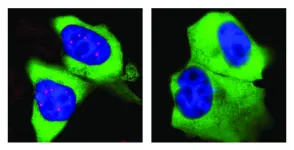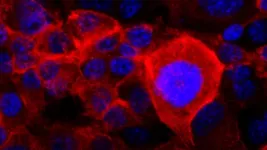(Press-News.org) New research published in the Journal of Medicinal Food suggests eating prunes each day can improve risk factors for cardiovascular disease (CVD) including raising antioxidant capacity and reducing inflammation among healthy, postmenopausal women.
Cardiovascular disease is the number one cause of death worldwide posing a significant public health challenge.
The research led by San Diego State University reveals that prunes can positively affect heart disease risk.
"When you look at our prior research and the research of others combined with this new data, you'll see consistent evidence that eating prunes can promote health," said lead researcher Shirin Hooshmand, Ph.D., RD, Professor at the School of Exercise and Nutritional Sciences at San Diego State University.
In this randomized, controlled study, researchers found that eating 50 grams of prunes (about 5-6 prunes) each day for just 6 months resulted in improved CVD risk biomarkers - including raising the body's "good" cholesterol, known as HDL, and lowering the ratio of total cholesterol to HDL.
Eating prunes daily also promoted higher antioxidant capacity and lowered levels of the inflammatory cytokines interleukin-6 and tumor necrosis factor-alpha associated with CVD risk. Notably, body mass index and weight of the study participants were maintained during the trial despite adding prunes to the usual diet.
Researchers recruited 48 healthy, postmenopausal women who were divided into three groups - a control group who ate no prunes, and two treatment groups who consumed either 50 grams or 100 grams of prunes daily, throughout the six-month study. All other aspects of the women's diets and lifestyles remained similar to before the study. Various biomarkers of CVD risk were collected at the beginning and conclusion of the study to determine if there were any improvements in those biomarkers among those who consumed prunes. Interestingly, there were some similar positive results among those who ate 50 grams of prunes and those consuming 100 grams - suggesting that adding 5-6 prunes or more into the daily diet may have a positive effect on CVD risk.
"Reducing chronic inflammation and increasing antioxidant capacity in the body is associated with lower risk of CVD, along with many other diseases," said Mark Kern, Ph.D., RD, CSSD, Professor of Nutrition at the School of Exercise and Nutritional Sciences at San Diego State University. "Not only does this study show that prunes may be a good way to reduce inflammation and increase antioxidant capacity, it also suggests that eating prunes every day may improve cholesterol levels in postmenopausal women."
While the precise mechanisms and specific compounds that contribute to these beneficial effects have yet to be determined, naturally occurring antioxidant-powered phenolic compounds, fiber and other nutrients are thought to play a role. This study demonstrates that prunes may be a promising and convenient addition to the diet to reduce CVD risk and inflammation, while also improving antioxidant capacity.
The study adds to a growing body of evidence about the overall health and nutrition benefits of prunes, including bone health. Previous clinical research demonstrates a favorable bone response to prunes among postmenopausal women. Most recently, researchers reported that total bone mineral density increased in a postmenopausal woman with osteopenia after she consumed 50 grams of prunes daily for 16 months. This case study was published in the Bone Reports in May of this year.
INFORMATION:
FUNDING
The Journal of Medicinal Food study was funded by the San Diego State University Grant Program, the California Prune Board (No. 57114A; ClinicalTrials.gov, No. NCT02325895), and the Kasch-Boyer Endowed Scholarship in Exercise and Nutritional Sciences in San Diego State University.
The Bone Reports study was funded by the California Prune Board.
REFERENCES
Hong MY, Kern M, Nakamichi-Lee M, Abbaspour N, Ahouraei Far A, Hooshmand S. (2021) Dried Plum Consumption Improved Total Cholesterol and Antioxidant Capacity and Reduces Inflammation in Healthy Postmenopausal Women. J Med Food. 10.1089/jmf.2020.0142.
Strock NCA, Koltun KJ, Weaver C, De Souza MJ. (2021) Dried Plum Consumption Improves Bone Mineral Density in Osteopenic Postmenopausal Woman: A Case Report. Bone Rep. doi: https://doi.org/10.1016/j.bonr.2021.101094.
ABOUT THE CALIFORNIA PRUNE BOARD
Created in 1952, The California Prune Board aims to amplify the premium positioning and top-of-mind awareness of California Prunes through advertising, public relations, promotion, nutrition research, crop management and sustainability research, and issues management. The California Prune Board represents approximately 800 prune growers and 28 prune, juice, and ingredient handlers under the authority of the California Secretary of Food and Agriculture.
"Workforce issues are the most significant challenges facing the long-term care industry," states the opening editorial of a new special issue of The Gerontologist titled " END ...
Almost all cells in our body contain a nucleus: a somewhat spherical structure that is separated from the rest of the cell by a membrane. Each nucleus contains all the genetic information of the human being. So it serves as a kind of library - but one with strict requirements: If the cell needs the building instructions for a protein, it won't simply borrow the original information. Instead, a transcript of it is made in the nucleus.
The machinery required for this is very complex, not least because the transcripts are not simple copies. In addition to essential information, genes also contain numerous passages of meaningless "garbage". They are removed when the transcript is made. Biologists call this editorial revision ...
Persons suffering from the autoimmune disease multiple sclerosis can develop various neurological symptoms caused by damage to the nervous system. Especially in early stages, these may include sensory dysfunction such as numbness or visual disturbances. In most patients, MS starts with recurring episodes of neurological disability, called relapses or demyelinating events. These clinical events are followed by a partial or complete remission. Especially in the beginning, the symptoms vary widely, so that it is often difficult even for experienced doctors to interpret them correctly to arrive at a diagnosis of MS.
Above-average numbers of medical appointments
It has been evident for some ...
The most comprehensive molecular study to date of the brains of people who died of COVID-19 turned up unmistakable signs of inflammation and impaired brain circuits.
Investigators at the Stanford School of Medicine and Saarland University in Germany report that what they saw looks a lot like what's observed in the brains of people who died of neurodegenerative conditions such as Alzheimer's disease and Parkinson's disease.
The findings may help explain why many COVID-19 patients report neurological problems. These complaints increase with the severity of infection with SARS-CoV-2, the virus that causes COVID-19. And they can persist as an aspect of "long COVID," a long-lasting disorder that sometimes ...
If only it were as simple as finding more grassland for an antelope.
The story of efforts to conserve the endangered oribi in South Africa represent a diaspora of issues as varied as the people who live there. On its surface, like many threatened species, you have conflict between a need for habitat and private landownership.
But dig a little deeper and you'll uncover a seedy underbelly of political corruption, gambling, struggles over land, and racial tensions. No matter how much success is made through more traditional conservation efforts, says a new study by a University of Georgia researcher, the species ...
Rutgers scientists have used a diagnostic technique for the first time in the opioid addiction field that they believe has the potential to determine which opioid-addicted patients are more likely to relapse.
Using an algorithm that looks for patterns in brain structure and functional connectivity, researchers were able to distinguish prescription opioid users from healthy participants. If treatment is successful, their brains will resemble the brain of someone not addicted to opioids.
"People can say one thing, but brain patterns do not lie," said Suchismita Ray, lead researcher and an associate professor in the Department of Health Informatics at Rutgers School of Health Professions. "The brain patterns that ...
Cancer cells can become resistant to treatments through adaptation, making them notoriously tricky to defeat and highly lethal. Cold Spring Harbor Laboratory (CSHL) Cancer Center Director David Tuveson and his team investigated the basis of "adaptive resistance" common to pancreatic cancer. They discovered one of the backups to which these cells switch when confronted with cancer-killing drugs.
KRAS is a gene that drives cell division. Most pancreatic cancers have a mutation in the KRAS protein, causing uncontrolled growth. But, drugs that shut off mutant KRAS do not stop the proliferation. ...
Lifestyle changes for demand-side climate change mitigation is gaining more and more importance and attention. A new IIASA-led study set out to understand the full potential of behavior change and what drives such changes in people's choices across the world using data from almost two billion Facebook profiles.
Modern consumption patterns, and especially livestock production in the agricultural sector to sustain the world's growing appetite for animal products, are contributing to and speeding the advance of interconnected issues like climate change, air pollution, and biodiversity ...
Imagine flexible surgical instruments that can twist and turn in all directions like miniature octopus arms, or how about large and powerful robot tentacles that can work closely and safely with human workers on production lines. A new generation of robotic tools are beginning to be realized thanks to a combination of strong 'muscles' and sensitive 'nerves' created from smart polymeric materials. A research team led by the smart materials experts Professor Stefan Seelecke and Junior Professor Gianluca Rizzello at Saarland University is exploring fundamental aspects of this exciting field of soft robotics.
In the factory of ...
As well as bright colours and subtle scents, flowers possess many invisible ways of attracting their pollinators, and a new study shows that bumblebees may use the humidity of a flower to tell them about the presence of nectar, according to scientists at the Universities of Bristol and Exeter.
This new research has shown that bumblebees are able to accurately detect and choose between flowers that have different levels of humidity next to the surface of the flower.
The study, published this week in the Journal of Experimental Biology, showed that bees could be trained to differentiate between two types of artificial flower with different levels of humidity, if only one of the types of flower provided the bee with a reward of sugar water.
To make sure that the artificial flowers ...



